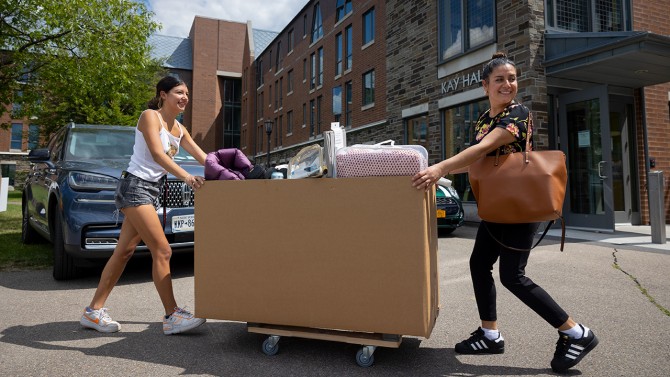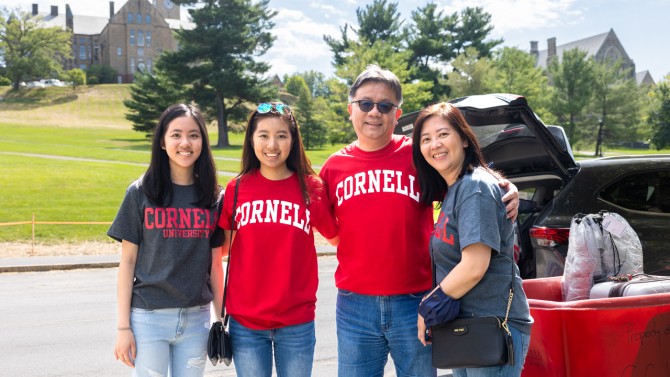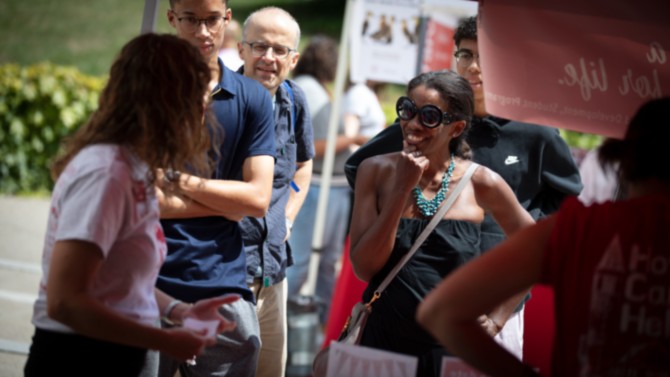Cornell welcomes students, marks milestone in residential life
By Caitlin Hayes, Cornell Chronicle
As students begin moving in on Aug. 15, Cornell will mark a milestone in residential life – the final three buildings of the North Campus Residential Expansion will open, enabling all first- and second-year students to live on campus or in Cornell-affiliated housing.
The expansion has been 6 1/2 years in the making, with Toni Morrison and Ganędagǫ: halls opening last year, adding 800 beds, and Barbara McClintock, Hu Shih, and Ruth Bader Ginsburg halls adding 1,200 beds this fall.
“It can’t be said enough that the expansion is a truly transformative project,” said Ryan Lombardi, vice president for student and campus life. “It supports and accomplishes so many elements of our institutional vision for our student experience and is a very big first step in a long-term strategy around renewal and improvement of the residential experience.”
The move-in process has been extended from three days to five to accommodate the greater numbers, with first-year students arriving Aug. 15-17 and upper-class students moving in Aug. 18-19.
“I’m really excited for this year, especially after the last couple of years which were so dominated by COVID,” said Tim Blair, executive director of housing and residential life. “While the pandemic isn’t over, it does feel like we’re now able to get back to what we are here to do. And having the first- and second-year students all on campus demonstrates the importance of a residential life experience in creating a foundation for our students’ success as they move through their Cornell careers.”
In addition to the buildings, a new turf field will open this semester on North Campus, as well as a cafe, Novick’s, in Ruth Bader Ginsburg Hall. The complex of buildings also includes a dining hall and fitness center, and each building has wellness and study spaces and dedicated spaces for students from throughout campus to gather.
The expansion allows Cornell to provide higher quality housing, both in the new buildings and by enabling updates to older buildings on campus; Balch Hall, for example, is currently closed for remodeling, which wouldn’t be possible without the additional housing. The added space will also allow the university to grow enrollment incrementally, and to relieve pressure on the local housing market. Most importantly, it will facilitate the implementation of new and improved programming to support first- and second-year students and build strong communities.
“We’re really changing the foundation for how we work with students in the halls,” said Abby Priehs, director of residential life. “We’re emphasizing intentional interactions, facilitated by the resident advisers, to ensure students are getting the resources they need in both their first and second year.”
The new facilities were designed with community in mind, with each building providing community spaces, including kitchens where groups of students can prepare and share meals.
“After the last two years of the pandemic, I think it’s more important than ever to make sure we’re providing the right environment for students to connect with each other and thrive,” Lombardi said. “I’m excited to see how these design choices play out this year in our three new buildings.”
New and transfer students will begin Orientation on Aug. 18, with First Night on North from 8 to 11 p.m. On Aug. 21, they’ll cap the five days of orientation events with the New Student Convocation from 11 a.m. to noon and Post-Convocation Picnic and Lawn Games from noon to 2 p.m., both on Schoellkopf Field.
Orientation will offer new students many opportunities to learn about Cornell and begin building community from their first moments on campus. In addition to information sessions, library and resource tours, meetings with resident advisers and Orientation leaders, social events include a First Year Festival Aug. 18 from 8 to 11 p.m. in Barton Hall, with bounce houses, food and giveaways, and a S’mores and Movie Night Aug. 19 from 8 to 11 p.m. on the Arts Quad.
Cornell’s Caring Community – a re-envisioned event this year in partnership with the Skorton Center for Health Initiatives and the Office of Student Conduct and Community Standards – will introduce students to ways to navigate life at Cornell through student testimonials, and familiarize them to the standards and expectations of being a Cornell student. This event is being offered in four smaller sessions (on Aug. 20), rather than one large session as in previous years, to make it more engaging.
“This is one required presentation for students, but it’s also a big step in the direction I see Orientation moving in the future,” said Kevin Perry, the new Jack and Rilla Neafsy Director of the Tatkon Center for New Students. “We want these kinds of presentations to be collaborative and engaging, an opportunity to present information to students but doing so in a way that helps them feel connected to the Cornell community.”
Numerous Orientation events are also geared towards families, to help them learn about Cornell and how they can support their students. Programming includes the Big Red Welcome Fest on Ho Plaza (Aug. 15-17, 11 a.m. to 3 p.m.) and the Family Orientation Welcome Receptions in Willard Straight Hall (Aug. 15-17, 4 to 6 p.m.).
All students can find opportunities, beyond Move In week, to learn about Cornell resources and groups and find community on the Weeks of Welcome calendar.
'Visions of Dante': Seeing the Italian poet with new eyes
Media Contact
Get Cornell news delivered right to your inbox.
Subscribe



